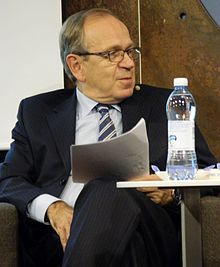
The Trilateral Commission is a nongovernmental international organization aimed at fostering closer cooperation between Japan, Western Europe and North America. It was founded in July 1973, principally by American banker and philanthropist David Rockefeller, an internationalist who sought to address the challenges posed by the growing economic and political interdependence between the U.S. and its allies in North America, Western Europe, and Japan. The leadership of the organization has since focused on returning to "our roots as a group of countries sharing common values and a commitment to the rule of law, open economies and societies, and democratic principles".
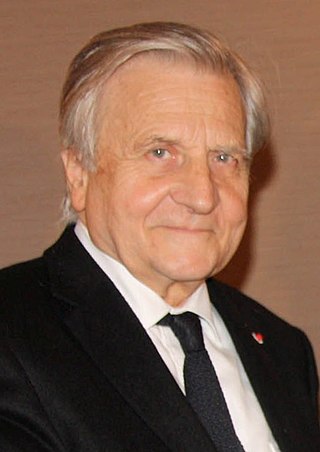
Jean-Claude Trichet is a French economist who was President of the European Central Bank from 2004 to 2011. Previous to his assumption of the presidency he was Governor of the Bank of France from 1993 to 2004.

Bruegel is a think tank devoted to policy research on economic issues. Based in Brussels, it launched its operations in 2005 and currently conducts research in five different focus areas with the aim of improving economic debate and policy-making.

The European System of Central Banks (ESCB) is an institution that comprises the European Central Bank (ECB) and the national central banks (NCBs) of all 27 member states of the European Union (EU). Its objective is to ensure price stability throughout the EU, and improve monetary and financial cooperation between eurozone and non-eurozone member states of the EU.

Marek Marian Belka is a Polish professor of economics and politician who has served as Prime Minister of Poland and Finance Minister of Poland in two governments. He is a former director of the International Monetary Fund's (IMF) European Department and former Head of Narodowy Bank Polski. He has served as a Member of the European Parliament (MEP) since July 2019.
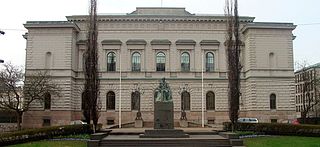
The Bank of Finland is the Finnish member of the Eurosystem and has been the monetary authority for Finland from 1865 to 1998, issuing the Finnish markka. It views itself as the fourth oldest surviving central bank in the world, after Sweden's Riksbank, the Bank of England, and the Bank of France, having been originally created in 1811-1812 as the Office of Exchange, Lending, and Deposits of the Grand Duchy of Finland before taking its current name in 1840. Unlike many other longstanding central banks, it has always been government-owned.
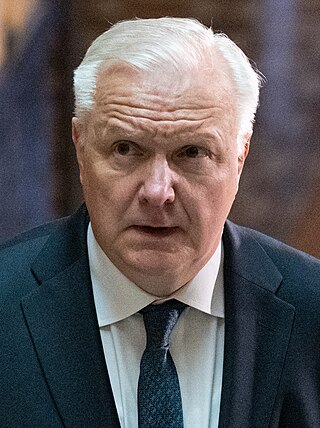
Olli Ilmari Rehn is a Finnish public official who has been serving as governor of the Bank of Finland since 2018. A member of the Centre Party, he previously served as the European Commissioner for Enlargement from 2004 to 2010, European Commissioner for Economic and Monetary Affairs and the Euro from 2010 to 2014, and Minister of Economic Affairs in Juha Sipilä's cabinet from 2015 until 2016. Rehn ran for President of Finland as an independent candidate in 2024, but was not elected.

Ewald Nowotny is an Austrian economist and social democratic politician and former governor of Austria's central bank Oesterreichische Nationalbank. He was also a member of the European Central Bank’s governing council.

Étienne, Count Davignon is a Belgian former diplomat, top civil servant, businessman, and former vice-president of the European Commission.

Axel Alfred Weber is a German economist, professor, and banker. He is currently a board member and chairman of Swiss investment bank and financial services company, UBS Group AG, and has announced his resignation effective 7 April 2022.

Sirkka Aune-Marjatta Hämäläinen is a Finnish economist who served as a member of the Executive Board of the European Central Bank from 1998 to 2003. She previously served as the governor of the Bank of Finland from 1992 to 1998. Hämäläinen was the first woman to hold either post.

José M. González-Páramo is a Spanish economist who served as a member of the Executive Board of the European Central Bank from 2004 to 2012.
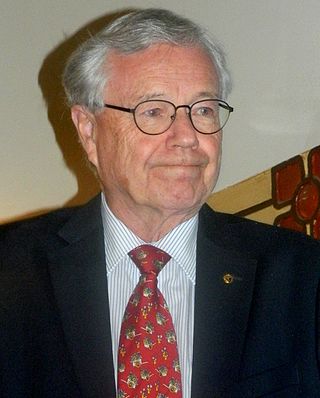
Matti Kalevi Louekoski is a Finnish politician and a lawyer by profession. He is a member of the Social Democratic Party of Finland (SDP) and a former long-term member of the governing board of the Bank of Finland.

Klaas Henderikus Willem Knot is a Dutch economist and central banker who is the current president of the Dutch central bank De Nederlandsche Bank (DNB). In this capacity he serves as a member of the Governing Council of the European Central Bank (ECB), as well as of the board of governors of the International Monetary Fund (IMF). Knot also holds a position as Professor in Monetary Stability at the University of Amsterdam and honorary professor at the University of Groningen.
The International Financial Reporting Standards Foundation or IFRS Foundation is a nonprofit organization that oversees financial reporting standard-setting. Its main objectives include the development and promotion of the International Financial Reporting Standards (IFRS), through the International Accounting Standards Board (IASB) for accounting standards and the International Sustainability Standards Board (ISSB) for sustainability-related standards.
The Liikanen Report or "Report of the European Commission’s High-level Expert Group on Bank Structural Reform" is a set of recommendations published in October 2012 by a group of experts led by Erkki Liikanen, governor of the Bank of Finland and ECB council member. On 3 July 2013, by large majority the European Parliament adopted an own initiative report called "Reforming the structure of the EU banking sector" that welcomes structural reform measures at Union level to tackle concerns on Too big to fail banks, that led to the publication of a proposal of Regulation on structural measures improving the resilience of EU credit institutions in January 2014. This proposal was withdrawn in July 2018.
The European banking union refers to the transfer of responsibility for banking policy from the member state-level to the union-wide level in several EU member states, initiated in 2012 as a response to the 2009 Eurozone crisis. The motivation for the banking union was the fragility of numerous banks in the Eurozone, and the identification of a vicious circle between credit conditions for these banks and the sovereign credit of their respective home countries. In several countries, private debts arising from a property bubble were transferred to the respective sovereign as a result of banking system bailouts and government responses to slowing economies post-bubble. Conversely, weakness in sovereign credit resulted in deterioration of the balance sheet position of the banking sector, not least because of high domestic sovereign exposures of the banks.
The separation of investment and retail banking aims to protect the "utility" aspects of day-to-day banking from being endangered by losses sustained by higher-risk investment activities. This can take the form of a two-tier structure in which a company is banned from doing both activities, or enforcing a legal ring-fence between two divisions of a company. Banks have resisted this separation saying that it increases costs for consumers.

Fabio Panetta is an Italian economist who has been serving as Governor of the Bank of Italy since 2023. He previously served as a member of the Executive Board of the European Central Bank from 2020 until 2023. Prior to his ECB appointment, Panetta served as Senior Deputy Governor of the Bank of Italy and concurrently as President of the Institute for the Supervision of Insurance from May to December 2019.
